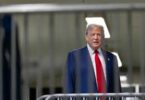Abdullah Muradoglu
Relations between the U.S. and western Europe were quite tense during Donald Trump’s presidency. Trump, who was strongly in favor of Brexit, imposed additional trade tariffs on EU countries. Trump not only forced the EU to withdraw from the Iran Nuclear Deal, he also showed strong reaction to the Nord Stream 2 pipeline project, which will deliver Russian natural gas to Germany via the Baltic Sea. Meanwhile, Trump’s attitude in relation to NATO tarnished America’s credibility. Now, the U.S. and Europe are running on different tracks regarding several other subjects.
The Trump administration had pressured EU countries to support his anti-China policies. The EU, for its part, signed the Comprehensive Agreement on Investment (CAI) with China. New U.S. President Joe Biden, who is known to be against the Nord Stream 2 project, is perturbed by this agreement with China. Trump is not the only reason behind the fallout between western Europe and the U.S. Even though Biden may suspend Tru-mp’s decision to withdraw U.S. troops in Germany, it will not be easy for alliance relations to return to what they once were.
The perception of America in U.S. ally countries has taken a negative turn. According to a global leadership ranking survey, the U.S., China, and Russia are almost at equal levels. The Biden administration wants the U.S. to rise back up to its so-called global leadership role, and rebuild the alliance with Europe. However, Europe does not have the same sentiments with regards to the U.S. Implying in his statements on Thursday that Trump’s policies are over, Biden said, “America is back on the global stage.” Europeans are pleased about Trump’s exit. However, this alone is not sufficient to recover the U.S.-Europe alliance. EU’s leading countries do not want to deal the U.S. all the cards. The “strategic autonomy” comment by French President Emmanuel Macron, who spoke the same day at the Atlantic Council Forum, in reference to Europe, was intriguing, to say the least.
The Council on Foreign Relations (CFR) is the framework organization of American political elites. The European Union has a CFR as well. The European Council on Foreign Relations (ECFR) conducts public polls at regular intervals. I recently came across an article by ECFR Director Mark Leonard titled, “The Crisis of American Power.” The title of another article Leonard co-wrote with Bulgarian political scientist Ivan Krastev is “How Europeans see Biden’s America.”
Drawing attention to both the “democracy crisis” and the “power crisis” in t-he U.S., Leonard references a poll run by the ECFR.
According to the poll, even though Europeans may sympathize with Biden, this does not mean they will automatically support the U.S. in future conflicts.
The vast majority in key EU countries think that the A-merican political system is corrupt. Europeans believe that the conditions which will produce a new Trump are ripe.
According to Leonard, Europe’s “geopolitics of emotions” aimed at the U.S. has largely chan-ged, and this is not associated with Trump alone.
One other striking result obtained from the ECFR poll is that Europeans think they need to invest in their own defense. Increasing mistrust regarding Washington’s reliability and power changed the nature of the Atlantic alliance. Europeans want their governments to remain “indifferent” in the event of a conflict between the U.S. and Russia or the U.S. and China. Europeans do not want to return to a “bipolar world order” with China on one end.
The Soviets lost the “Cold War,” but the “New Cold War” may lead to different results. Six out of every 10 people who participated in the ECFR survey think China will be much more powerful than the U.S. Many Europeans look skeptically upon the U.S.’s capacity to shape the world. Europeans, who are now more positive about themselves, have strong doubts about America’s power and political system.
According to Leonard, there is an unprecedented opportunity to revive and transform the Transatlantic alliance – but this is not feasible through unconvincing “restoration” and “bipolarity” promises. The U.S.-Europe alliance alone is not enough to reshape the world.
Hence, there is a need for a new “Atlanticism.” As can be understood from Leonard’s analyses, a world in which “I move, and everything moves with me” is now history for the U.S.






